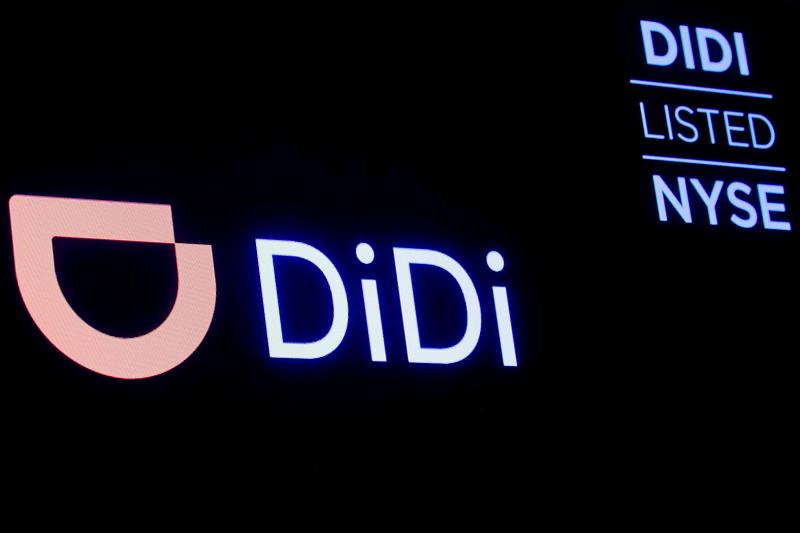The US Securities and Exchange Commission (SEC) is investigating Didi Global Inc’s (滴滴) chaotic debut in New York last year, when the ride-hailing giant raised US$4.4 billion days before revelations of a Chinese probe into data security tanked the stock.
Didi’s shares slid 7 percent in extended trading, deepening an 85 percent loss since its initial public offering (IPO) in the summer of last year.
US lawmakers had last year called for an investigation into Didi’s controversial IPO — the biggest by a Chinese firm since Alibaba Group Holding Ltd (阿里巴巴).

Photo: Reuters
The Cyberspace Administration of China (CAC), Beijing’s cybersecurity watchdog, stunned investors by announcing its investigation into Didi two days after the listing, suspending the Internet giant’s main apps from domestic stores.
That precipitated a flurry of regulatory action against gig-economy and Internet companies, culminating in a decision to force Didi to delist from New York and float in Hong Kong instead.
It is unclear when the SEC launched its own probe into the matter. Didi devoted just a few lines on the US investigation well into a 170-plus-page regular filing on Monday.
“After our initial public offering in the United States, the SEC contacted us and made inquiries in relation to the offering,” the filing read. “We are cooperating with the investigation, subject to strict compliance with applicable PRC [People’s Republic of China] laws and regulations. We cannot predict the timing, outcome or consequences of such an investigation.”
Didi last month said that it had not applied to move to another exchange, surprising investors who anticipated a smoother transition.
Beijing officials told the CAC that they were not satisfied with the proposed punishments and asked for revisions, people familiar with the matter said.
Didi shareholders are to vote on its delisting at a special meeting on May 23.
In related news, the US is moving toward imposing sanctions on Chinese video surveillance company Hikvision Digital Technology Co (海康威視數字技術), the Financial Times (FT) reported yesterday, citing four people familiar with the talks.
US President Joe Biden’s administration is considering placing human rights-related sanctions on the Chinese company, the FT reported.
The sanctions, if enforced, could have dire consequences for the maker of surveillance equipment, which was added to a list of firms threatening US national security.
Washington has begun briefing allies, given that Hikvision has customers in more than 180 countries, two of the sources told the FT.
The Federal Communications Commission had in March last year designated five Chinese companies, including Hikvision, as posing a threat to national security under a 2019 law aimed at protecting US communications networks.
China’s Huawei Technologies Co (華為), ZTE Corp (中興通訊), Hytera Communications Corp (海能達通訊) and Zhejiang Dahua Technology Co (大華技術) were also on the list.
Additional reporting by Reuters

CAUTIOUS RECOVERY: While the manufacturing sector returned to growth amid the US-China trade truce, firms remain wary as uncertainty clouds the outlook, the CIER said The local manufacturing sector returned to expansion last month, as the official purchasing managers’ index (PMI) rose 2.1 points to 51.0, driven by a temporary easing in US-China trade tensions, the Chung-Hua Institution for Economic Research (CIER, 中華經濟研究院) said yesterday. The PMI gauges the health of the manufacturing industry, with readings above 50 indicating expansion and those below 50 signaling contraction. “Firms are not as pessimistic as they were in April, but they remain far from optimistic,” CIER president Lien Hsien-ming (連賢明) said at a news conference. The full impact of US tariff decisions is unlikely to become clear until later this month

With an approval rating of just two percent, Peruvian President Dina Boluarte might be the world’s most unpopular leader, according to pollsters. Protests greeted her rise to power 29 months ago, and have marked her entire term — joined by assorted scandals, investigations, controversies and a surge in gang violence. The 63-year-old is the target of a dozen probes, including for her alleged failure to declare gifts of luxury jewels and watches, a scandal inevitably dubbed “Rolexgate.” She is also under the microscope for a two-week undeclared absence for nose surgery — which she insists was medical, not cosmetic — and is

GROWING CONCERN: Some senior Trump administration officials opposed the UAE expansion over fears that another TSMC project could jeopardize its US investment Taiwan Semiconductor Manufacturing Co (TSMC, 台積電) is evaluating building an advanced production facility in the United Arab Emirates (UAE) and has discussed the possibility with officials in US President Donald Trump’s administration, people familiar with the matter said, in a potentially major bet on the Middle East that would only come to fruition with Washington’s approval. The company has had multiple meetings in the past few months with US Special Envoy to the Middle East Steve Witkoff and officials from MGX, an influential investment vehicle overseen by the UAE president’s brother, the people said. The conversations are a continuation of talks that

CHIP DUTIES: TSMC said it voiced its concerns to Washington about tariffs, telling the US commerce department that it wants ‘fair treatment’ to protect its competitiveness Taiwan Semiconductor Manufacturing Co (TSMC, 台積電) yesterday reiterated robust business prospects for this year as strong artificial intelligence (AI) chip demand from Nvidia Corp and other customers would absorb the impacts of US tariffs. “The impact of tariffs would be indirect, as the custom tax is the importers’ responsibility, not the exporters,” TSMC chairman and chief executive officer C.C. Wei (魏哲家) said at the chipmaker’s annual shareholders’ meeting in Hsinchu City. TSMC’s business could be affected if people become reluctant to buy electronics due to inflated prices, Wei said. In addition, the chipmaker has voiced its concern to the US Department of Commerce